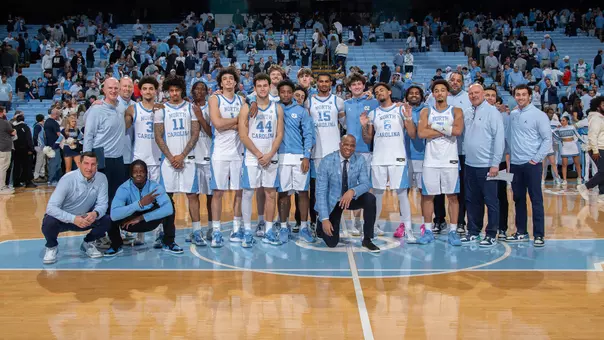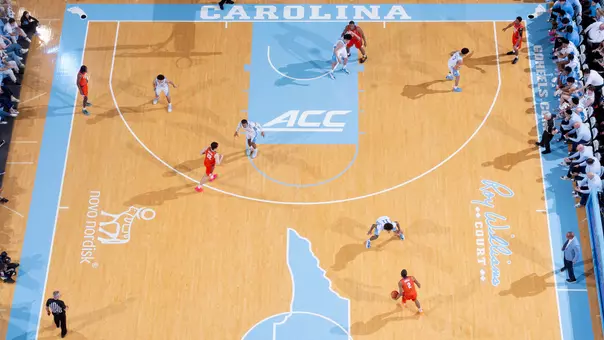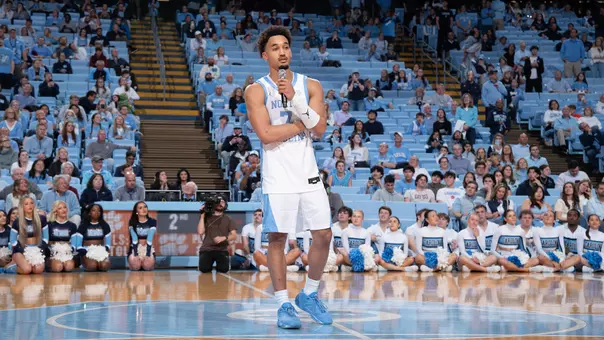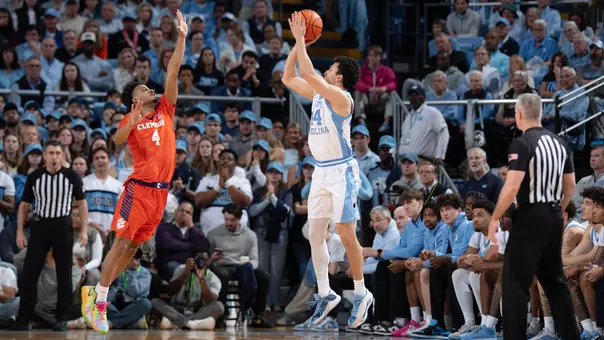University of North Carolina Athletics
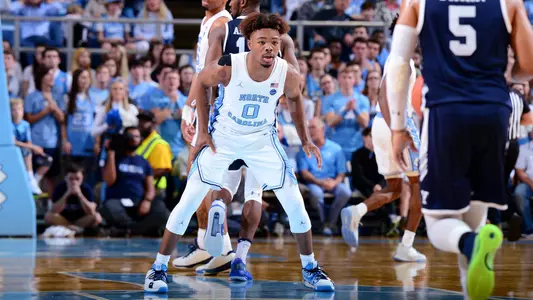
Photo by: Jeffrey A. Camarati
Lucas: Harris Putting In Work
May 20, 2020 | Men's Basketball, Featured Writers, Adam Lucas
Anthony Harris is putting in early mornings as he rehabs at home from an ACL injury.
By Adam Lucas
Three or four times a week, Anthony Harris wakes up at 5:45 a.m. so he can get in a workout before going to physical therapy, before going to his online summer school classes, before working out again, before adding in some basic basketball skill sessions.
"I like the tough days," he says. "I like the days when I feel like I'm getting better, and I can see the results and feel a lot stronger."
Harris is rehabbing at home in Virginia from a torn right ACL he suffered in Carolina's game against Yale on Dec. 30. Thirteen months earlier, he'd torn his left ACL during a high school game; he recovered from that injury in time to play just five games for the Tar Heels before his injury.
"I knew as soon as it happened," he said of the second injury, which happened in front of the home bench at the Smith Center. "I sat down and looked straight at my dad. It was crazy to me. I was shocked, but I didn't want to go off the court screaming in pain or freak anybody else out. In the locker room, I stayed up and I was saying I was alright, but I already knew what had happened."
Harris' importance to his teammates was evident in an extremely emotional Carolina locker room that evening. Jeremiah Francis, who had been through numerous morning workout sessions with Harris as the duo rehabbed together, was one of numerous players who were visibly upset. Roy Williams paid Harris the ultimate compliment and compared his work ethic to that of Tyler Hansbrough.
But Harris never publicly wallowed, even as his team noticeably missed the contributions he'd made during his brief first season. It's not a coincidence that one of Carolina's best wins of the year, a ten-point victory over a UCLA team that finished 19-12, came in a game in which Harris played 17 minutes, made five of his seven field goals, scored all 14 of his points in the second half and was the defensive spark the Tar Heels needed (see #2 here as a reminder of how he made an impact both tangibly and intangibly).
It was obvious Carolina missed his presence on the court in the subsequent months, and it was obvious he missed being available. But already facing a significant physical challenge, he tried to contain the impact of his absence on his mental health.
"I knew I wouldn't be able to progress mentally or physically if I was in my feelings," Harris said. "I already knew what to expect from the rehab. Me sulking wasn't going to do anything for anybody, so I tried to get over it. There were some tough moments and sometimes tough days, and there still are. But I have confidence that the work will get me back to where I need to be."
And there has been plenty of work. In addition to his in-person sessions with his physical therapist, Harris meets weekly via FaceTime or Zoom with Carolina athletic trainer Doug Halverson and strength and conditioning coach Jonas Sahratian. It helps that both individuals have already had first-hand exposure to Harris' work ethic. With some younger players, there might be a question about whether they possessed the commitment to rehab in this unique situation. With Harris, there are no questions. Halverson and Sahratian update their plans for Harris on a weekly basis.
"I feel great right now and my legs are good," Harris said. "I'm not having any pain, and I can actually see myself getting stronger."
For now, while he works towards being able to add more cutting and lateral movements to his workouts, Harris is doing some limited basketball work. He's able to do some shooting and ballhandling drills in addition to his film study.
There is no hard timeline for Harris' return to anything that resembles practice, a situation made more complex by the fact that no one actually knows when anything that resembles practice will occur again. Both sessions of UNC summer school are taking place online and the campus is currently closed.
When he's cleared to return to the court—at which point he'll have four years of eligibility remaining, having received a medical redshirt for the 2019-20 campaign—Harris plans to focus on the same elements of his game that made him so valuable in limited appearances last season.
"I just have to work," he said. "I want to be aggressive and help us get stops on defense. If you work on defense, the offensive side is going to come. When I get back to it, I'll start the game on defense and let the game come to me."
Three or four times a week, Anthony Harris wakes up at 5:45 a.m. so he can get in a workout before going to physical therapy, before going to his online summer school classes, before working out again, before adding in some basic basketball skill sessions.
"I like the tough days," he says. "I like the days when I feel like I'm getting better, and I can see the results and feel a lot stronger."
Harris is rehabbing at home in Virginia from a torn right ACL he suffered in Carolina's game against Yale on Dec. 30. Thirteen months earlier, he'd torn his left ACL during a high school game; he recovered from that injury in time to play just five games for the Tar Heels before his injury.
"I knew as soon as it happened," he said of the second injury, which happened in front of the home bench at the Smith Center. "I sat down and looked straight at my dad. It was crazy to me. I was shocked, but I didn't want to go off the court screaming in pain or freak anybody else out. In the locker room, I stayed up and I was saying I was alright, but I already knew what had happened."
Harris' importance to his teammates was evident in an extremely emotional Carolina locker room that evening. Jeremiah Francis, who had been through numerous morning workout sessions with Harris as the duo rehabbed together, was one of numerous players who were visibly upset. Roy Williams paid Harris the ultimate compliment and compared his work ethic to that of Tyler Hansbrough.
But Harris never publicly wallowed, even as his team noticeably missed the contributions he'd made during his brief first season. It's not a coincidence that one of Carolina's best wins of the year, a ten-point victory over a UCLA team that finished 19-12, came in a game in which Harris played 17 minutes, made five of his seven field goals, scored all 14 of his points in the second half and was the defensive spark the Tar Heels needed (see #2 here as a reminder of how he made an impact both tangibly and intangibly).
It was obvious Carolina missed his presence on the court in the subsequent months, and it was obvious he missed being available. But already facing a significant physical challenge, he tried to contain the impact of his absence on his mental health.
"I knew I wouldn't be able to progress mentally or physically if I was in my feelings," Harris said. "I already knew what to expect from the rehab. Me sulking wasn't going to do anything for anybody, so I tried to get over it. There were some tough moments and sometimes tough days, and there still are. But I have confidence that the work will get me back to where I need to be."
And there has been plenty of work. In addition to his in-person sessions with his physical therapist, Harris meets weekly via FaceTime or Zoom with Carolina athletic trainer Doug Halverson and strength and conditioning coach Jonas Sahratian. It helps that both individuals have already had first-hand exposure to Harris' work ethic. With some younger players, there might be a question about whether they possessed the commitment to rehab in this unique situation. With Harris, there are no questions. Halverson and Sahratian update their plans for Harris on a weekly basis.
"I feel great right now and my legs are good," Harris said. "I'm not having any pain, and I can actually see myself getting stronger."
For now, while he works towards being able to add more cutting and lateral movements to his workouts, Harris is doing some limited basketball work. He's able to do some shooting and ballhandling drills in addition to his film study.
There is no hard timeline for Harris' return to anything that resembles practice, a situation made more complex by the fact that no one actually knows when anything that resembles practice will occur again. Both sessions of UNC summer school are taking place online and the campus is currently closed.
When he's cleared to return to the court—at which point he'll have four years of eligibility remaining, having received a medical redshirt for the 2019-20 campaign—Harris plans to focus on the same elements of his game that made him so valuable in limited appearances last season.
"I just have to work," he said. "I want to be aggressive and help us get stops on defense. If you work on defense, the offensive side is going to come. When I get back to it, I'll start the game on defense and let the game come to me."
Players Mentioned
MBB: Seth Trimble Senior Speech - March 3, 2026
Wednesday, March 04
MBB: Elijah Davis Senior Speech - March 3, 2026
Wednesday, March 04
UNC Men's Basketball: Bogavac Leads Tar Heels By Clemson, 67-63
Wednesday, March 04
UNC Baseball: Tar Heels Take Midweek Matchup vs Elon, 5-1
Wednesday, March 04










